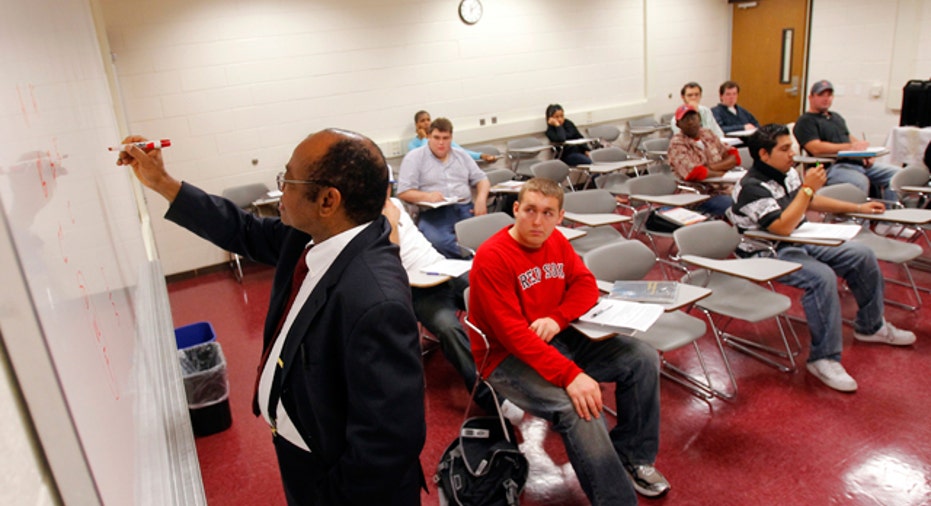Universities Turn to Outsourced Professors to Cut Costs

Growing up is tough enough without the worries of your financial future, so Money101 is here for you. E-mail us your questions and let us take off some of the pressure.
Colleges and universities struggling with dwindling budgets and smaller endowments are increasingly turning to outsourcing faculty in order to cut costs.
“Colleges and universities have effectively been outsourcing instruction for decades now by utilizing part-time and adjunct faculty members,” says Craig Smith, deputy director of the American Federation of Teachers (AFT) Higher Education Division. “However, as college costs continue to rise and as a result student debt after college becomes unmanageable, more and more students and their families are beginning to ask why increased cost is occurring at the same time as investment in direct instruction has decreased.”
With high unemployment and an average state budget shortfall estimate of –16.9%, most state public universities faced significant budget cuts for the 2011 school year, according to a study conducted by US News and World Reports.
Both Florida Atlantic University and Missouri State University recently partnered with the Poynter Institute, a non-profit journalism training group, to outsource their online journalism classes.
“FAU's decision to participate in the pilot program was based on the forward-looking vision of its journalism program, with its focus on multimedia journalism in a convergent digital media landscape,” says Eric Freedman, assistant dean of the Dorothy F. Schmidt College of Arts and Letters at Florida Atlantic University.
Although colleges argue that outsourcing professors and academic programs are beneficial to both the students and the school, some worry this cost-saving measure can taint a school’s reputation and take away from the students’ learning experience.
What this means for schools
While Missouri State University decided not to continue its relationship with Poynter because students weren’t writing as much as it wanted, the school isn’t giving up on outsourcing staff.
Mark Biggs, head of the Media, Journalism and Film Department at Missouri State University, argues outsourcing faculty can add more resources for less money—good for both the school and students.
“It is not always easy to find good teachers to supply additional sections of multi-section classes,” he says. “Who doesn’t like learning from highly skilled, intelligent people even if they are located thousands of miles away.”
Smith says that despite good intentions to create more course accessibility for students, finances should not be the main driver of staffing decisions.
“We see what happens in that scenario by looking to the for-profit sector where students are enrolled, under-supported and leave in large numbers with unbearably large student debt,” he says. “The schools are taking in large profits so you could say the model they use is beneficial for the school or its stockholders, but it is devastating for students.”
But just because a class is being outsourced—doesn’t mean it is cheaper than those taught by permanent professors. According to Biggs, at Missouri State, the partnership was considerably more expensive for the delivery of one online class than for a seated per course section.
“The point here was not cost reduction--it was to explore ways we might be able to increase quality, incorporate a new learning approach and form a connection with a leader in journalism education,” he says.
According to Smith, over half of undergraduate courses at public colleges and universities are currently taught by contingent faculty and instructors, with many earning a very low wages with little to no benefits or professional support for their effort.
“Staffing our college classrooms in this manner may be beneficial to an institution’s bottom line, but it does a disservice to professional educators and the students they serve,” he says.
What this means for students
Matthew Greene, educational director at educational consulting and counseling firm Howard Greene and Associates, explains that while larger schools are more likely to outsource their faculty, the best of small-to-medium-sized liberal arts universities encourage close interaction with the students. "This can bring students directly into the faculty research and writing experience, or foster small seminar-style learning environments and dialogue that is hard to replicate with faculty who commute on and off campus, or who teach one class here and there."
To the contrary, Biggs explains that while communication is a critical skill, it is not the only way to learn.
“Have I learned less because I read a book instead of learning about the content of that book from a professor?” he says. “Great professors can inspire and help their students make connections, consider new ways of seeing the world…but this relationship doesn’t depend on physical proximity.”
However, outsourced learning may make it difficult for students to build personal, longer-term relationships with faculty, something that is important to many high school seniors and their parents, says Smith.
“A growing body of research has demonstrated that greater reliance on contingent faculty can lead to diminished student performance as measured by graduation, transfer and time to degree,” says Smith.



















